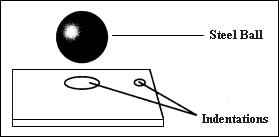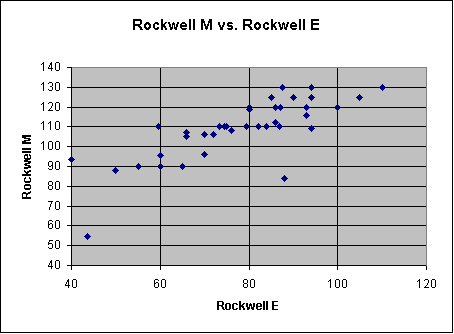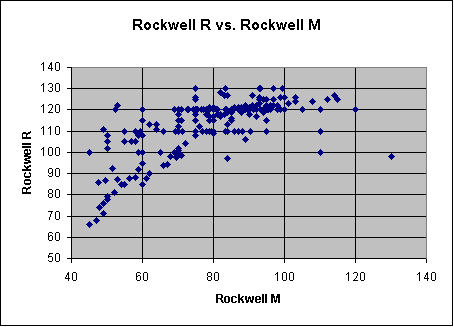| 用 MatWeb 登广告! | ||
| 越过59,000 以上, 金属、塑料、陶瓷和合成物的数据资料库。 | ||
|
主页 • 搜寻 • 工具 • 供应商 • 文件夹 • 有关我们 • 常用问题 • 登录 • |
||
| | | | | | |
|
||||
Rockwell Hardness Testing of Plastics
The hardness testing of plastics is most often measured by the Rockwell hardness test or Shore (durometer) hardness test. Both methods measure the resistance of the plastic toward indentation, thereby providing an empirical hardness value. These hardness values do not necessarily correlate to other properties or fundamental characteristics. Rockwell hardness is generally chosen for 'harder' plastics such as nylon, polycarbonate, polystyrene, and acetal where the resiliency or creep of the polymer is less likely to affect the results. The Ball Indentation Hardness test (ISO 2039-1; DIN 53456) is used in Europe much more often than in North America. The Barcol harness test is sometimes chosen for thermoset polymers. The figure below, from Quadrant Engineering Plastic Products, shows the Rockwell hardness test geometry.
The results obtained from this test are useful measures of relative resistance to indentation of various grades of plastics. However, the Rockwell hardness test does not serve well as a predictor of other properties such as strength or resistance to scratches, abrasion, or wear, and should not be used alone for product design specifications. Different Rockwell hardness scales utilize different size steel balls and different loads. The three most common scales used for plastics are Rockwell E, Rockwell M, and Rockwell R; results reported from the Rockwell L scale are much rarer. Many other Rockwell hardness scales are used for metals, with Rockwell A, Rockwell B, and Rockwell C being the three most common. As seen in the charts below, the correlation between the Rockwell scales used for plastics is weak; attempts at conversion between the scales are therefore discouraged. The charts below are taken from data in MatWeb's database provided by polymer manufacturers for specific product grades. Comparison of Rockwell Hardness Scales
Other hardness topics in MatWeb: |
|
订阅特级服务 高级先进 • 构成份 • 特性 • 材料类型 • 制造商 • 商标 • UNS号码 广告 • 递交资料 • 资料库许可证 • 网址设计管理 • 交易发行 供应商名单 • 单位转变 • 参考 • 新消息 • 链接站 • 协助 • 通讯 • 网址图示 • 常用问题 • 主页 |
||
| 请读关于材料数据的使用许可协议和我们的隐私权。询问或评论有关 MatWeb? 请与webmaster@matweb.com 联系。我们感谢您对 MatWeb的参与。
本站点由 Automation Creations, Inc. 设计和维护。这个网站的内容, MatWeb 的商标,与 "MatWeb" 由 Automation Creations, Inc.版权1996-2006拥有 。 MatWeb 意欲为个人使用 , 非商业用途。这个站点的内容、结果和技术数据,未经由 Automation Creations, Inc. 允许, 不可以被电子,摄影或实质上地再生产或自动化创作。 |
||


